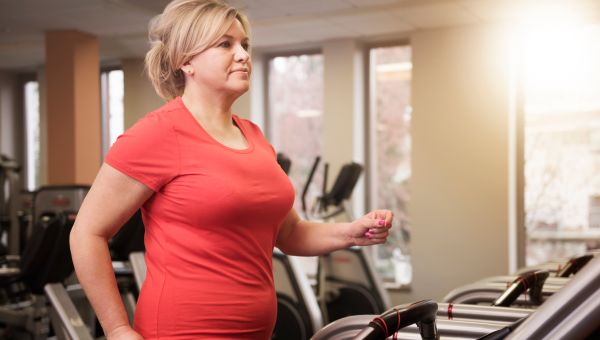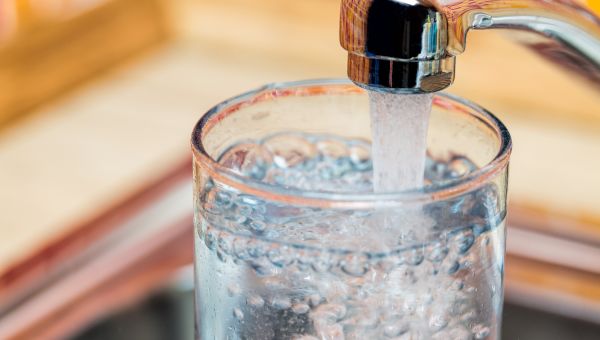5 ways to lose weight during menopause
Even though your body is changing, there are proven ways to maintain weight, lose weight, and prevent weight gain in the first place.
Updated on November 4, 2022

During menopause, it’s common for people to deal with a number of symptoms, from hot flashes to night sweats to weight gain. While a shift in body temperature can be inconvenient and uncomfortable, carrying extra pounds has been linked to numerous chronic conditions, including diabetes, heart disease, and cancer.
Lisa Ann Golik, MD, an OBGYN at Saint Agnes Medical Center in Fresno, California, explains that natural aging and hormonal changes are often to blame. “A decrease in estrogen and progesterone levels can predispose a woman to gaining weight in the abdominal area,” she says. “Also with aging, there is a noted reduction in muscle mass and increase in fatty tissue mass.” That’s not all—your metabolism slows, and many people tend to be less active as they grow older, too.
With that in mind, here are effective strategies for preventing weight gain, maintaining your weight, and losing weight once you hit menopause.

Keep A Log
Dr. Golik says that the first step to achieving a healthy weight is to honestly assess your diet and physical activity. “Write down what you do for exercise and what you eat in a day,” she advises.
Research has frequently linked tracking your food intake to weight loss. For example, one 2021 review in the journal Obesity of 39 studies found that participants who tracked using a digital health app consistently dropped pounds.
As for overweight and obese postmenopausal women, according to one 2012 study in the Journal of the Academy of Nutrition and Dietetics, those who maintained a food journal lost more weight than those who didn’t keep a journal. On average, the journal-keepers dropped about 6 more pounds.
“You may find that there are extra calories finding their way into your diet that you didn't realize, and you may think that you are more active than you really are,” adds Golik.

Tailor Your Diet
Medical experts continue to debate the ultimate eating plan for weight loss, though many agree eating fewer calories is necessary. Whether you're trying to maintain your weight or slim down, it’s wise to focus on a healthy, balanced diet consisting largely of fruit, vegetables, whole grains, and lean protein. Remember to go easy on sodium, added sugars and saturated fats, and eliminate trans fats, as well.
The Mediterranean diet is often recommended as a smart choice for losing or maintaining weight, both before and after menopause. One small study published in the journal Nutrients in 2020 found that menopausal women who followed a Mediterranean-style eat were able to lose about the same amount of body fat as women who had not yet hit menopause.
In another small study published in Menopause in 2021, postmenopausal women lost almost 8 pounds following a low-fat, plant-based diet including a daily serving of soybeans. It significantly improved hot flash symptoms, as well. The group who didn’t follow the eating plan actually gained weight.

Schedule Activity Time
Make a calendar appointment on your smartphone to do something fitness-related, encourages Golik. “It doesn’t have to be going to the gym,” she says. “It could be taking a group exercise class in a park or walking with friends.”
As for dropping pounds, physical activity can help. Postmenopausal women who paired a weight-loss diet with aerobic and strength exercises lost slightly more weight than those who dieted without exercise, in a 2019 Dutch study published in BMC Public Health. Subcutaneous fat—fat found just under the skin—was reduced significantly with the addition of exercise.
Even light exercise can affect your weight management big-time as you age. Another 2015 study from the University of Massachusetts Amherst suggested that women who were more active had lower BMIs and other body composition measures, including those who did light physical activity like walking and yard work. The benefits were greater in postmenopausal women compared to those who were premenopausal.
Almost any regular physical activity helps improve overall health. But to drop pounds and keep them off, you should combine it with a strategy for healthy eating.

Go For H2O
Research on whether drinking more water leads to greater weight loss isn’t conclusive. But in terms of a healthy diet, H2O is better than sugary beverages like soda and fruit juice. There’s even evidence that replacing those drinks with water may lead to weight loss over time.
It should be noted: People’s water needs vary greatly depending on temperature and humidity, as well as their activity level and medical conditions. For some, drinking too much water can be dangerous. Ask a health provider about the ideal water intake for you.

Lean On Others
“If you need help, ask for it,” advises Golik. “Find a friend who also is concerned about their health. Keep tabs on each other and support one another during the process.”
You may want to try getting fit together. “A fitness buddy will help you be more accountable,” adds Golik. A buddy system can also work via videoconferencing if you’re unable to see each other in person.
If no one in your inner circle is trying to slim down or enjoys exercise, a virtual weight loss counselor might do the trick. People who took part in an online weight intervention program were more likely to drop pounds and keep them off a year later than those who didn’t receive the guidance, found one 2016 study in The Lancet Diabetes & Endocrinology.
Ask your healthcare provider about finding an online coach or digital forum that’s right for you.

WomensHealth.gov. Menopause and your health. September 21, 2018.
Silva TR, Oppermann K, Reis FM, Spritzer PM. Nutrition in Menopausal Women: A Narrative Review. Nutrients. 2021 Jun 23;13(7):2149.
Nutrition.gov. Interested in Losing Weight? Accessed November 2, 2022.
Patel ML, Wakayama LN, Bennett GG. Self-Monitoring via Digital Health in Weight Loss Interventions: A Systematic Review Among Adults with Overweight or Obesity. Obesity. March 2021. 29(3): pp 478-499.
Gibbs BB, Kinzel LS, et al. Short- and Long-Term Eating Habit Modification Predicts Weight Change in Overweight, Postmenopausal Women: Results from the WOMAN Study. Journal of the Academy of Nutrition and Dietetics. September 1, 2012. Volume 12, Issue 9, pp1347-1355.
Knight MG, Anekwe C, et al. Weight regulation in menopause. Menopause. 2021 May 24;28(8):960-965.
A Kong, S Beresford, et al. Self-monitoring and eating-related behaviors are associated with 12-month weight loss in postmenopausal overweight-to-obese women. Journal of the Academy of Nutrition and Dietetics. September 1, 2012. 112(9), 1428–1435.
Chopra S, Sharma KA, et al. Weight Management Module for Perimenopausal Women: A Practical Guide for Gynecologists. J Midlife Health. 2019 Oct-Dec;10(4):165-172.
Lombardo M, Perrone MA, Guseva E, Aulisa G, Padua E, Bellia C, Della-Morte D, Iellamo F, Caprio M, Bellia A. Losing Weight after Menopause with Minimal Aerobic Training and Mediterranean Diet. Nutrients. 2020 Aug 17;12(8):2471.
Barnard ND, Kahleova H, et al. The Women's Study for the Alleviation of Vasomotor Symptoms (WAVS): a randomized, controlled trial of a plant-based diet and whole soybeans for postmenopausal women. Menopause. 2021 Jul 12;28(10):1150-1156.
Centers for Disease Control and Prevention. Physical Activity for a Healthy Weight. Last reviewed June 16, 2022.
Centers for Disease Control and Prevention. Finding a Balance of Food and Activity. Last reviewed February 13, 2022.
Centers for Disease Control and Prevention. Losing Weight. Last reviewed September 19, 2022
van Gemert WA, Peeters PH, et al. Effect of diet with or without exercise on abdominal fat in postmenopausal women – a andomized trial. BMC Public Health. 2019. 19(174).
26th Annual Meeting of The North American Menopause Society September 30–October 3, 2015, Las Vegas, NV. Menopause. December 2015 - Volume 22 - Issue 12 - p 1361-1401.
Bracamontes-Castelo G, Bacardí-Gascón M, Jiménez Cruz A. Effect of water consumption on weight loss: a systematic review. Nutr Hosp. 2019 Dec 26;36(6):1424-1429.
P Little, B Stuart, et al. An internet-based intervention with brief nurse support to manage obesity in primary care (POWeR+): a pragmatic, parallel-group, randomised controlled trial. The Lancet Diabetes & Endocrinology. October 1, 2016. Volume 4, Issue 10, pp821-828.
More On


video

article

slideshow


video


video
